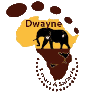Early History and Habitants
Botswana has been inhabited by humans since the dawn of modern humans about 100,000 years ago. The San and Khoi peoples were the original inhabitants of this area. They lived as hunter-gatherers and spoke Khoisan languages, noted for their click consonants. [2]
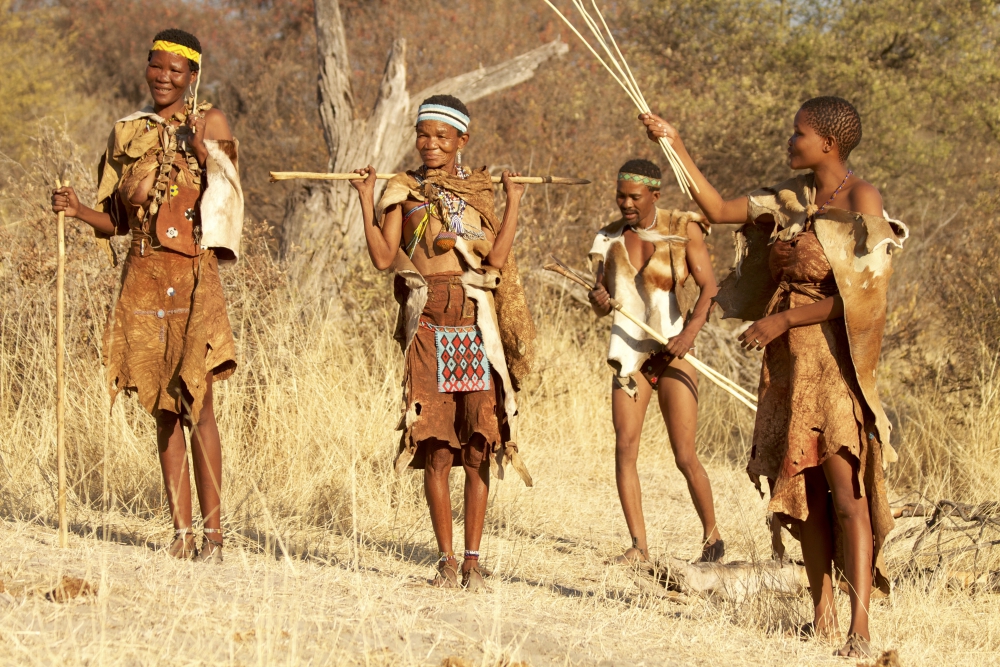
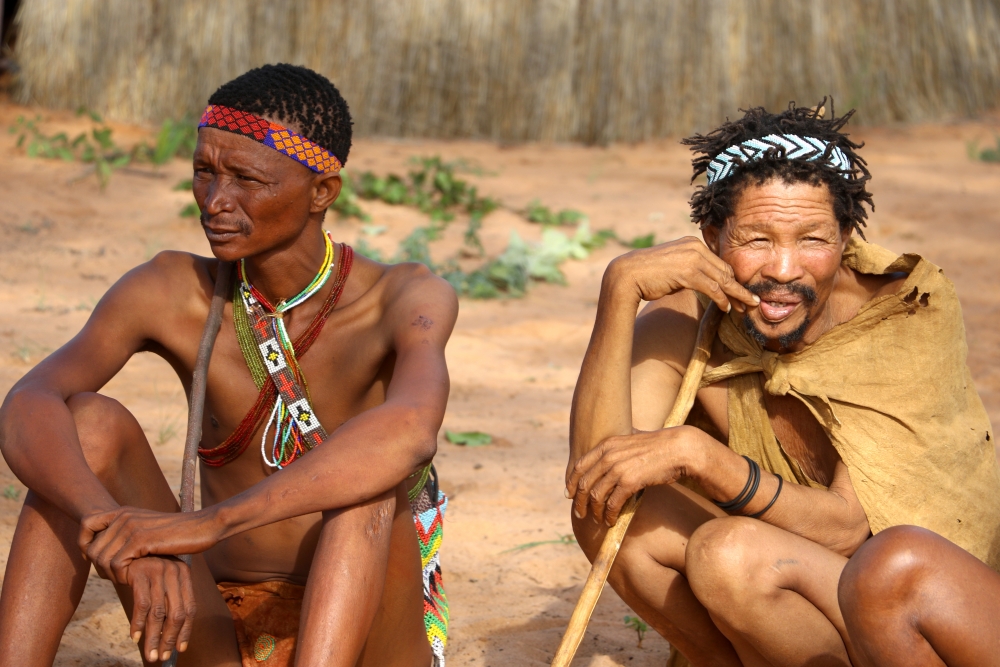

Bantu Migrations to Botswana
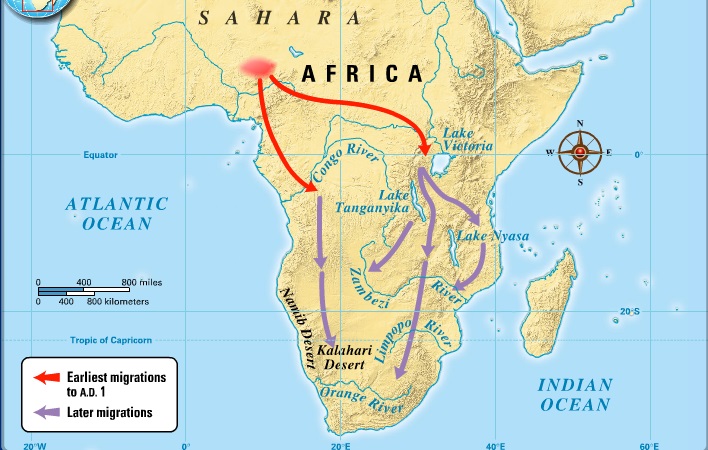
The Great Zimbabwe empire extended into eastern Botswana a thousand years ago, and more groups migrated into the Transvaal. The area's major ethnic group is the Batswana who were herders and farmers living in tribal groups. There were larger migrations into Botswana of these people from South Africa during the Zulu wars of the early 1800s. The group traded ivory and skins with the Europeans in exchange for guns and were Christianized by missionaries. [2]
Establishment of the Bechuanaland Protectorate
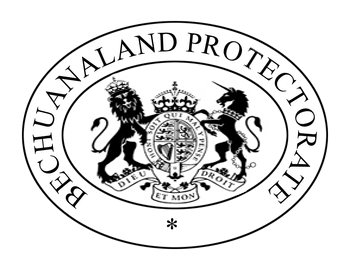
In the 19th century, hostilities broke out between Tswana inhabitants of Botswana and Ndebele tribes who were making incursions into the territory from the north-east. Tensions also escalated with the Dutch Boer settlers from the Transvaal to the east. After appeals by the Batswana leaders Khama III, Bathoen and Sebele for assistance, the British Government put Bechuanaland under its protection on 31 March 1885. The northern territory remained under direct administration as the Bechuanaland Protectorate and is modern-day Botswana, while the southern territory became part of the Cape Colony and is now part of the northwest province of South Africa. The majority of Setswana-speaking people today live in South Africa. When the Union of South Africa was formed in 1910 out of the main British colonies in the region, the Bechuanaland Protectorate, Basutoland (now Lesotho) and Swaziland (the High Commission Territories) were not included, but provision was made for their later incorporation. However, their inhabitants began to be consulted by the UK, and although successive South African governments sought to have the territories transferred, the UK kept delaying; consequently, it never occurred. The election of the Nationalist government in 1948, which instituted apartheid, and South Africa's withdrawal from the Commonwealth in 1961, ended any prospect of incorporation of the territories into South Africa. An expansion of British central authority and the evolution of tribal government resulted in the 1920 establishment of two advisory councils to represent both Africans and Europeans. Proclamations in 1934 regulated tribal rule and powers. A European-African advisory council was formed in 1951, and the 1961 constitution established a consultative legislative council. [1]
Botswana Gains Independence 🎉 🎊
In June 1964, the UK accepted proposals for a democratic self-government in Botswana. The seat of government was moved in 1965 from Mafikeng in South Africa, to the newly established Gaborone, which sits near the border. The 1965 constitution led to the first general elections and to independence on 30th September 1966.
At the time of independence the National Assembly comprised the Speaker of the National Assembly namely Hon. Dr A. Merriweather, thirty-one (31) elected Members, four (4) Specially Elected Members. Members of Cabinet were drawn from the membership of the National Assembly. His Excellency Sir Seretse Khama had been elected as Member of Parliament for Serowe North in 1965, and he continued as such until 1969 when legislation was passed allowing for the present system of Presidential elections whereafter he relinquished his position as MP for Serowe North. At independence, membership of the National Assembly was as follows:
The Speaker: The Hon. Dr. Alfred Merriweather O. B. E.
Deputy Speaker: Mr Gaefalale G. Sebeso - (Tswapong South)
The Cabinet
- The Hon. Seretse M. Khama - Serowe North) Prime Minister
- The Hon. Quette J. Masire - (Kanye South) Deputy Prime Minister
- The Hon. Archelaus Tsoebebe - (Bobirwa) Minister of Labour and Social Services
- The David J. C. Morgan - (Specially Elected) Minister of Works and Communications
- The Hon. Moutlakgola P. K. Nwako - (Tswapong North) Minister of Agriculture
- The Hon. Amos M. Dambe - (Mmadinare) Minister of Mines, Commerce and Industry
- The Hon. Tsheko Tsheko - (Okavango) Minister of Local Government
- The Hon. Alan G. Tilbury - Attorney General
Other Government Members
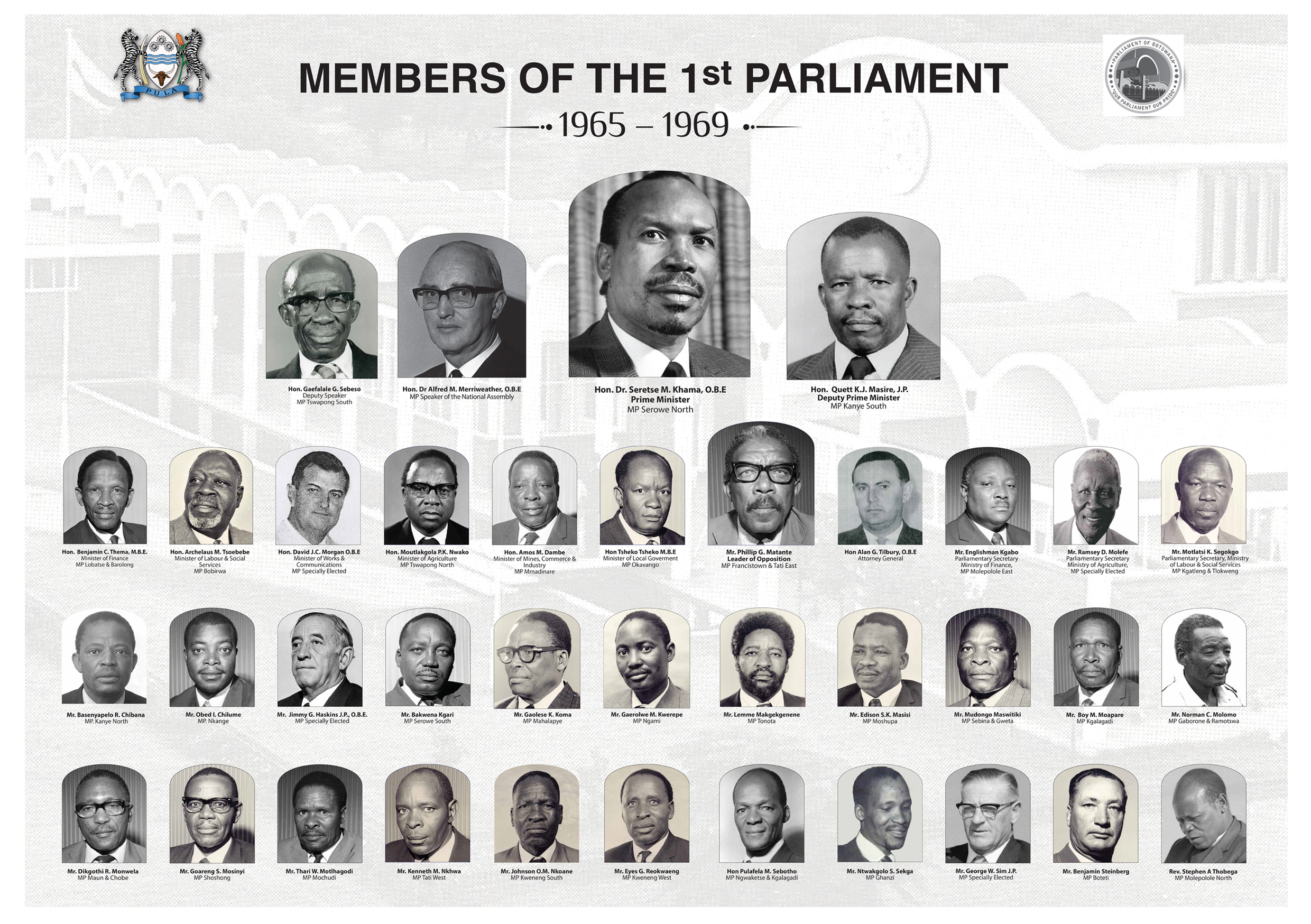
- The Hon. Basenyapelo R. Chibana - Kanye North
- The Hon. ObedΒ I.Β Chilume - Nkange
- The Hon. James G. Haskins - Specially Elected
- The Hon. Bakwena Kgari - Serowe South
- The No. Gaolese K. Koma - Mahalapye
- The Hon. Gaerolwe M. Kwerepe - Ngami
- The Hon. Lemme Makgekgenene - Tonota
- The Hon. Edison S. Masisi - Moshupa
- The Hon. Mudongo Maswikiti - Sebina and Gweta
- The Hon. Boy M. Moapare - Kgalagadi
- The Hon. Norman C. Molomo - GaboroneΒ and Ramotswa
- The Hon. Dikgothi R. Monwela - Maun and Chobe
- The Hon. Goareng S. Mosinyi - Shoshong
- The Hon. Johnson O. M. Nkoane - Kweneng South
- The Hon. Eyes G. Reokwaeng - Kweneng West
- The Hon. Pulafela M. Sebotho - Ngwaketse and Kgalagadi
- The Hon. Ntwakgolo. Sekga - Ghanzi
- The Hon. George W. Sim - Specially Elected
- The Hon. Benjamin Steinberg - Boteti
- The Hon. Rev. Stephen A. Thobega - Molepolole
Opposition Members
- The Hon. Phillip. G. Matante - Francistown and Tati
- The Hon. Thari W. Motlhagodi - Mochudi
- The Hon. Kenneth M. Nkhwa - Tati West
Parliament Secretaries
- Mr Englishman Kgabo (Molepolole East) - Ministry of Finance
- Mr Ramsey D. Molefe (Specially Elected) - Ministry of Agriculture
- Mr Motlatsi K. Segokgo (Kgatleng and Tlokweng) - Ministry of Labour and Social Services
REFERENCES
[2] https://www.thoughtco.com/brief-history-of-botswana-43607
[3] https://www.parliament.gov.bw/index.php/about-parliament/history/first-parliament-of-botswana



